
Legalizing Same-Sex Marriage: The Key to Advancing Human Rights
The concept of same-sex marriage is different around the world. Around 36 countries approved such marriages. It simple words this marriage is called gay marriage which means the marriage of two people of the same legal sex. For example- marriage of a man with another man and marriage of a woman with another woman. Michael McConnell and Jack Baker were the first couple who performed same sex marriage in 1971 in US. The first law providing for marriage equality between same-sex and opposite-sex couples was passed in the continental Netherlands in 2000 and took effect on 1 April 2001. In whole world only medical and scientific communities including human rights and civil rights activist are the best supporters of same-sex wedding and religious fundamentalist groups are the opponents of the same.
According to Article 12 of the European Convention on Human Rights states that: "Men and women of marriageable age have the right to marry and to found a family, according to the national laws governing the exercise of this right". In 2010, the European Court of Human Rights (ECHR) ruled in Schalk and Kopf v Austria, The court found, that the human rights of the same sex couple had not been violated. The court further stated that same-sex unions are not protected under art. 12 of European Court of Human Rights (ECHR) i.e. their "Right to marry". It exclusively protects the right to marry of opposite-sex couples (without regard if the sex of the partners is the result of birth or of sex change), Under art. 8 of European Court of Human Rights (ECHR) "Right to respect for private and family life" is protected and art. 14 Prohibits discrimination on the ground of same sax marriage.
sThe position of these marriages in India is different. Here in India, generally marriage is based on religion. India did not have specific legislation that allowed same-sex couples to marry or afforded them the same legal rights and protections as opposite-sex couples. Marriage laws in India are primarily governed by personal laws that are specific to different religious communities. Recently, a Supreme Court Bench issued notices to the Centre and the Attorney General of India, seeking their response to two petitions filed to allow solemnization of same-sex marriage under the Special Marriage Act (SMA) 1954. One of the petitions argues that the recognition of same-sex marriage was only a “sequel” or a continuation of-
The Navtej Singh Johar judgment of 2018 (decriminalising homosexuality) and
The Puttaswamy judgment of 2017 (affirming the Right to Privacy as a fundamental right).
Solicitor General Tushar Mehta for the Centre had said that as per the law, marriage was permissible between a “biological man” and “biological woman”.
The SMA provides a civil form of marriage for couples who cannot marry under their personal law, and both the recent pleas seek to recognize same-sex marriage in relation to this Act and not personal laws.
Decision of Apex Court - India’s Supreme Court made a significant decision, declining an appeal to legalize same-sex marriages in the country, dealing a blow to LGBTQ rights in one of the world’s most populous nations. Chief Justice Dhananjaya Yeshwant Chandrachud emphasized that issues like same-sex marriage should be within the domain of the parliament, highlighting the court’s commitment to steering clear of policy matters. Chandrachud also called for measures to prevent discrimination against LGBTQ individuals. This includes the establishment of hotlines and safe houses for vulnerable members of the LGBTQ community. Their responses regarding the morality, desirability, and administrative perquisites of same-sex partnerships have been equally diverse.
CONCLUSION.
The legal status of same-sex marriage continues to evolve globally as societies grapple with issues of equality, human rights, and social acceptance.
